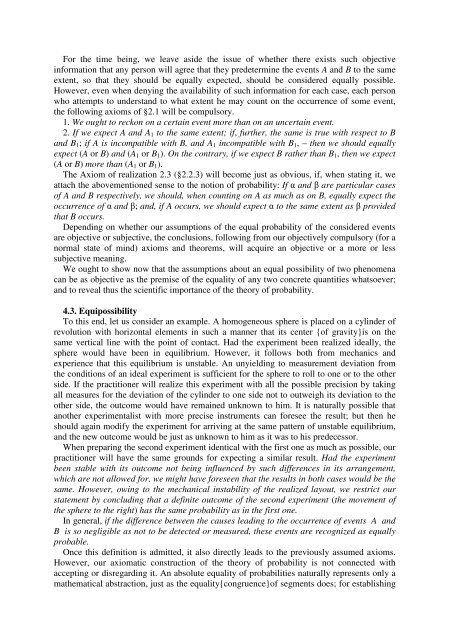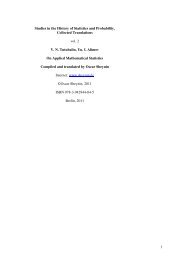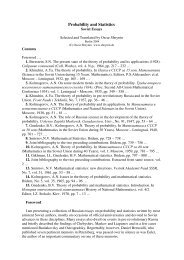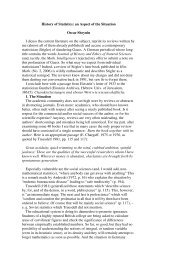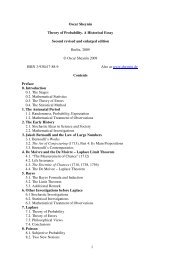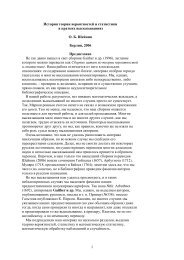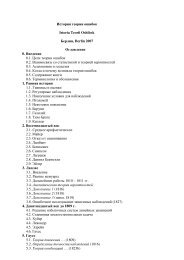For the time being, we leave aside the issue of whether there exists such objectiveinformation that any person will agree that they predetermine the events A <strong>and</strong> B to the sameextent, so that they should be equally expected, should be considered equally possible.However, even when denying the availability of such information for each case, each personwho attempts to underst<strong>and</strong> to what extent he may count on the occurrence of some event,the following axioms of §2.1 will be compulsory.1. We ought to reckon on a certain event more than on an uncertain event.2. If we expect A <strong>and</strong> A 1 to the same extent; if, further, the same is true with respect to B<strong>and</strong> B 1 ; if A is incompatible with B, <strong>and</strong> A 1 incompatible with B 1 , – then we should equallyexpect (A or B) <strong>and</strong> (A 1 or B 1 ). On the contrary, if we expect B rather than B 1 , then we expect(A or B) more than (A 1 or B 1 ).The Axiom of realization 2.3 (§2.2.3) will become just as obvious, if, when stating it, weattach the abovementioned sense to the notion of probability: If <strong>and</strong> are particular casesof A <strong>and</strong> B respectively, we should, when counting on A as much as on B, equally expect theoccurrence of <strong>and</strong> ; <strong>and</strong>, if A occurs, we should expect to the same extent as providedthat B occurs.Depending on whether our assumptions of the equal probability of the considered eventsare objective or subjective, the conclusions, following from our objectively compulsory (for anormal state of mind) axioms <strong>and</strong> theorems, will acquire an objective or a more or lesssubjective meaning.We ought to show now that the assumptions about an equal possibility of two phenomenacan be as objective as the premise of the equality of any two concrete quantities whatsoever;<strong>and</strong> to reveal thus the scientific importance of the theory of probability.4.3. EquipossibilityTo this end, let us consider an example. A homogeneous sphere is placed on a cylinder ofrevolution with horizontal elements in such a manner that its center {of gravity}is on thesame vertical line with the point of contact. Had the experiment been realized ideally, thesphere would have been in equilibrium. However, it follows both from mechanics <strong>and</strong>experience that this equilibrium is unstable. An unyielding to measurement deviation fromthe conditions of an ideal experiment is sufficient for the sphere to roll to one or to the otherside. If the practitioner will realize this experiment with all the possible precision by takingall measures for the deviation of the cylinder to one side not to outweigh its deviation to theother side, the outcome would have remained unknown to him. It is naturally possible thatanother experimentalist with more precise instruments can foresee the result; but then heshould again modify the experiment for arriving at the same pattern of unstable equilibrium,<strong>and</strong> the new outcome would be just as unknown to him as it was to his predecessor.When preparing the second experiment identical with the first one as much as possible, ourpractitioner will have the same grounds for expecting a similar result. Had the experimentbeen stable with its outcome not being influenced by such differences in its arrangement,which are not allowed for, we might have foreseen that the results in both cases would be thesame. However, owing to the mechanical instability of the realized layout, we restrict ourstatement by concluding that a definite outcome of the second experiment (the movement ofthe sphere to the right) has the same probability as in the first one.In general, if the difference between the causes leading to the occurrence of events A <strong>and</strong>B is so negligible as not to be detected or measured, these events are recognized as equallyprobable.Once this definition is admitted, it also directly leads to the previously assumed axioms.However, our axiomatic construction of the theory of probability is not connected withaccepting or disregarding it. An absolute equality of probabilities naturally represents only amathematical abstraction, just as the equality{congruence}of segments does; for establishing
that the fall of a given die on any of its faces has one <strong>and</strong> the same probability, we may onlyuse those objective, but not absolutely precise methods of measurement, which are usuallyapplied in geometry <strong>and</strong> physics.Just as it happens when applying any mathematical theory, when precise equalities have tobe replaced by approximate equalities, it is therefore essential to study how will the theoremsof the theory of probability change if the probabilities mentioned there acquire slightarbitrary variations. Extremely important in this respect is, for example the Poisson theorem,without which the Bernoulli theorem would have been devoid of practical interest.4.4. <strong>Probability</strong> <strong>and</strong> CertaintyOn the strength of the considerations above, mathematical probability represents anumerical coefficient, a measure of expectation of the occurrence of an event given someconcrete data. It thus characterizes the objective connection between the observedinformation <strong>and</strong> the expected event. In particular, the dependence between the given data <strong>and</strong>a future event can be such that the data imply its certainty; that they are its cause, <strong>and</strong> itsprobability is 1. It should be borne in mind that certainty, just as probability, is alwaystheoretical; it is always possible that an incomplete correspondence between reality <strong>and</strong> ourtheoretical pattern disrupts or modifies the expected act of the cause.By definition, unconditionally certain can only be a result of an agreement or a logicalconclusion, whereas any prevision of a future fact is always based on induction, – that is, inthe final analysis, on a direct or oblique assumption that an event invariably occurring undergiven conditions will happen again under similar circumstances. By applying the principlesof the theory of probability, it can be shown that such a prevision has probability very closeto unity, i.e., to certainty. The other statements of the theory, having the same degree ofprobability, should therefore be considered as practically certain, bearing however in mindthat the mistake, caused by the incomplete correspondence between the preliminaryassumptions <strong>and</strong> reality, has no less chances of undermining the correctness of anyproposition than the fact that its probability does not entirely coincide with certainty.The study of many experiments, each of which is represented by some unstable pattern ofthe type indicated above, where the conditions to be allowed for compel us to assign definiteprobabilities to their outcomes, leads us, on the basis of calculations belonging to probabilitytheory, to statements known as the law of large numbers, which have approximately the samehigh probability as our inductive inferences. When employing that law, as when applyinginductive laws of nature, we ought to consider the possibility that the concrete conditions ofour experiment do not quite correspond to the theoretical layout. A definite result of theexperiment in both cases has therefore only a high probability rather than an absolutecertainty. A mistake, i.e., a non-occurrence of our prevision, is not impossible, it is onlyhighly improbable. But it is the feature of the law of large numbers that an occurrence of anunbelievable fact is not an unconditional indicator of the incorrectness of our theoreticalassumptions: the law tolerates exceptions. A detailed study, of how should we regard anadmitted hypothesis if the previsions based on it are often wrong, is beyond the boundaries ofthis paper. The theory of the probability of hypotheses, to which this issue belongs, is entirelyfounded on the axiom of realization 38 . Restricting our attention to general considerations, wemay only note that a prior estimate of the probability of some arrangements is usually veryarbitrary, so that only those conclusions, made in the context of that chapter of probabilitytheory, are of special interest which are more or less independent of such estimates.In itself, an occurrence of an unbelievable fact does not refute an hypothesis <strong>and</strong> onlyrepresents new information that can change its probability; there exists no pattern underwhich all the occurring phenomena have considerable probabilities 39 . Our only dem<strong>and</strong> onthe accepted hypothesis is that a greater part of the occurred facts should have possessed ahigh degree of probability with only a comparatively few of them having been unlikely. The
- Page 3:
of All Countries and to the Entire
- Page 6 and 7:
(Coll. Works), vol. 4. N.p., 1964,
- Page 8 and 9:
individuals of the third class, the
- Page 10:
From the theoretical point of view
- Page 13 and 14:
Second case: Each crossing can repr
- Page 15 and 16: On the other hand, for four classes
- Page 17 and 18: f i = i S + i , i = 1, 2, 3, 4, (
- Page 19 and 20: f 1 = C 1 P(f 1 ; …; f n+1 ), C 1
- Page 21 and 22: ut in this case f = 2 , f 1 = 2 ,
- Page 23 and 24: I also note the essential differenc
- Page 25 and 26: A 1 23n1 + 1 A 1 A 1 … A 11A 2 A
- Page 27 and 28: coefficient of 2 in the right side
- Page 29 and 30: h(A r h - c h A r 0 ) = - A r0we tr
- Page 31 and 32: Notes1. Our formulas obviously pres
- Page 33 and 34: Bernstein’s standpoint regarding
- Page 35 and 36: Corollary 1.8. A true proposition c
- Page 37 and 38: It is important to indicate that al
- Page 39 and 40: ut for the simultaneous realization
- Page 41 and 42: devoid of quadratic divisors and re
- Page 43 and 44: propositions (B i and C j ) can be
- Page 45 and 46: A ~ A 1 and B = B 1 , we will have
- Page 47 and 48: included in a given totality as equ
- Page 49 and 50: For unconnected totalities we would
- Page 51 and 52: proposition given that a second one
- Page 53 and 54: On the other hand, let x be a parti
- Page 55 and 56: totality is perfect, but that the j
- Page 57 and 58: In this case, all the finite or inf
- Page 59 and 60: probabilities p 1 , p 2 , … respe
- Page 61 and 62: where x is determined by the inequa
- Page 63 and 64: totality of the second type (§3.1.
- Page 65: x = /2 + /(23) + … + /(23… p n
- Page 69 and 70: infinitely many digits only dependi
- Page 71 and 72: 10. (§2.1.5). Such two proposition
- Page 73 and 74: F(x + h) - F(x) = Mh, therefore F(x
- Page 75 and 76: “confidence” probability is bas
- Page 77 and 78: x1+ Lp n (x) x1− Lx1+ Lf(t)dt < x
- Page 79 and 80: |(x 1 ; t 0 ; t 1 ) - 1 t0tf(t)dt|
- Page 81 and 82: 5. The distribution ofξ , the arit
- Page 83 and 84: P(x 1i < x) = F(x; a i ) = C(a i )
- Page 85 and 86: egards his promises. Markov shows t
- Page 87 and 88: other solely and equally possible i
- Page 89 and 90: notion of probability and of its re
- Page 91 and 92: However, already in the beginning o
- Page 93 and 94: the revolution. My main findings we
- Page 95 and 96: Nevertheless, Slutsky is not suffic
- Page 97 and 98: path that would completely answer h
- Page 99 and 100: on political economy as well as wit
- Page 101 and 102: scientific merit. Borel was indeed
- Page 103 and 104: [3] Already in Kiev Slutsky had bee
- Page 105 and 106: different foundation. The difficult
- Page 107 and 108: 5. On the criterion of goodness of
- Page 109 and 110: --- (1999, in Russian), Slutsky: co
- Page 111 and 112: Here also, the author considers the
- Page 113 and 114: second, it is not based on assumpti
- Page 115 and 116: experimentation and connected with
- Page 117 and 118:
Russian, and especially of the Sovi
- Page 119 and 120:
station in England. This book, as h
- Page 121 and 122:
Uspekhi Matematich. Nauk, vol. 10,
- Page 123 and 124:
variety and detachment of those lat
- Page 125 and 126:
46. On the distribution of the regr
- Page 127 and 128:
119. On the Markov method of establ
- Page 129 and 130:
No lesser difficulties than those e
- Page 131 and 132:
Separate spheres of work considerab
- Page 133 and 134:
10. Anderson, O. Letters to Karl Pe
- Page 135 and 136:
Hier sind, im Allgemeinen, ganz ana
- Page 137 and 138:
Jedenfalls, glaube ich erwiesen zu
- Page 139 and 140:
werde ich das ganze Material in kur
- Page 141 and 142:
considered as the limiting case of
- Page 143 and 144:
and, inversely,] = m ...1 2 N[ ch h
- Page 145 and 146:
µ 2 2 = m 2 2 - 2m 2 m 1 2 + m 1 4
- Page 147 and 148:
(x k - x k+1 ) … (x k - x +) = E(
- Page 149 and 150:
the thus obtained relations as pert
- Page 151 and 152:
[1/S(S - 1)(S - 2)][(Si = 1Sx i ) 3
- Page 153 and 154:
( N −1)((S − N )(2NS− 3S− 3
- Page 155 and 156:
µ 5 + 2µ 2 µ 3 = U [S/S] 5 + 2U
- Page 157 and 158:
case, the same property is true wit
- Page 159 and 160:
It follows that the question about
- Page 161 and 162:
then expressed my doubts). And Gned
- Page 163 and 164:
For Problem 1, formula (7) shows th
- Page 165 and 166:
Let us calculate now, by means of f
- Page 167 and 168:
ϕ′1(x)1E(a|x 1 ; x 2 ; …; x n
- Page 169 and 170:
Theorem 3. If the prior density 3
- Page 171 and 172:
P( ≤ ≤ |, 1 , 2 , …, s )
- Page 173 and 174:
6. A Sensible Choice of Confidence
- Page 175 and 176:
0 = A 0 n, = B2, = B2, 0 = C 0 n
- Page 177 and 178:
Note also that (95),(96), (83),(85)
- Page 179 and 180:
Γ(n / 2)Γ [( n −1) / 2]k = (1/2
- Page 181 and 182:
f (x 1 , x 2 , …, x n ) = 1 if x
- Page 183 and 184:
and the probability of achieving no
- Page 185 and 186:
E = kEµ. (14)In many particular ca
- Page 187 and 188:
a = np, b = np 2 = a 2 /n, = a/nand
- Page 189 and 190:
with number (2k - 2), we commit an
- Page 191 and 192:
(67)which is suitable even without
- Page 193 and 194:
" = 1/[1 - e - ], = - ln [1 - (1/
- Page 195 and 196:
Such structures are entirely approp
- Page 197 and 198:
11. As a result of its historical d
- Page 199 and 200:
exaggeration towards a total denial


